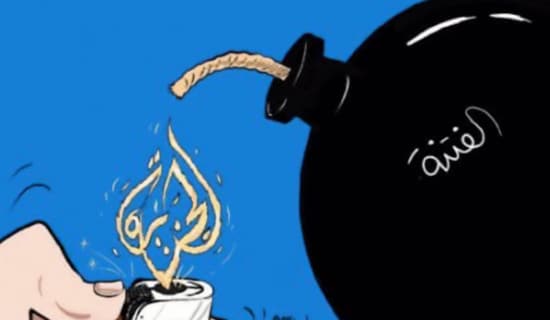On March 1, 2016, the Russian state-owned media outlet Sputnik published an article by Russian political scientist Ivan Zadorozhny titled "Why American GDP Won't Matter in a War with Russia." The article states that a U.S.-Russia war might happen in the foreseeable future, and that if it does, the U.S.'s apparent economic advantage over Russia will not last long. U.S. assets, the article says, are overvalued, and in the event of such a war, "a fall of asset values will follow, accompanied by a drop in the exchange rate of the U.S. dollar, which would decimate America's GDP." Then, the article states, U.S. military spending would "crumble."
In contrast, the article says, Russia would not be affected by the war; should Russia's GDP fall in dollar terms, it "will not mean fewer tanks," merely that the tanks have, in U.S. dollars, become "cheaper to produce." Furthermore, the U.S. military requires more funds than the Russian army to sustain its operations, because of "its focus on fighting beyond its homeland."
"In a possible clash with Russia, America would likely be striking across half the globe at Russian positions in Europe or Asia, complicating its logistics and raising the costs," the article stated, further explaining that a conventional war with Russia would raise "the specter of a nuclear Armageddon".

The article's ostensible economic analysis raises questions that it subsequently fails to address. For example, if there is a capital flight from the U.S. in the event of war with Russia, to which country will the capital and assets move? If the dollar collapses, what is the currency in which foreign trade will be conducted - wouldn't the euro collapse as well? Furthermore, the Russian economy is in recession, and the ruble has plummeted; with the current global oil surplus, wouldn't pressure on the price of oil be even greater if there is war? And what are Russia's alternative sources of foreign exchange?
Such talk of war in a Russian state-owned media outlet is in direct contrast with Russian officials' statements about the Kremlin's efforts to avoid conflict. This article is clearly part of a propaganda campaign to frighten the West and to remind it that the world is no longer unipolar but is now bipolar.
The following are excerpts from the Sputnik article, in the original English:[1]
Military Power Doesn't Directly Correlate To GDP
"It has been suggested by U.S. politicians and analysts that Russia is militarily outmatched by the U.S., because of the former's supposed economic weakness. Russia's GDP has been compared to that of Italy, the Netherlands, or California, in an apparent effort to belittle Russia. In 2013, the U.S. spent about US$582 billion on its military, while Russia's military budget, at the exchange rates [at the time], was about US$69 billion. These trends have largely held, and there is no doubt that the U.S. continues to outspend Russia in the military department. But is that a strength or weakness?
"There are problems with GDP or military budget comparisons, particularly if these are applied to Russia. First, military power doesn't directly correlate with GDP size. Second, in the case of Russia, the lack of any such correlation is glaringly evident. That Russia punches well above its economic weight is obvious to all. Suppose the American GDP is US$17 trillion and that of Russia is RUB 71 trillion.
"It's fair to say that presently the U.S. assets are considerably overvalued. That is mostly due to the huge amount of liquidity pumped by the Federal Reserve into the U.S. economy. In most countries, the excess liquidity would have long destroyed the currency. That this hasn't happened in the U.S. is explained mostly by the fact that the U.S. dollar remains by far the most popular world trade and reserve currency, making it possible for Washington essentially to export inflation without much consequence to itself.
"Likewise, the U.S.'s assets, particularly its government debt, enjoy global demand as an investment destination. In great measure their strength rests on a kind of security premium that investors associate with such assets.
"Because America is the world's preeminent economic and military power, where there is trouble in the world investors seek safety in U.S. assets. But once the security premium, the U.S. dollar's world currency status, and the other factors propping up America's asset values are stripped away, one is left with a dramatically shrunk GDP."
A War With Russia Would Raise The Specter Of A Nuclear Armageddon
"The campaigns that the US is waging right now across the globe against smaller nations pose no threat to America's security, and so tend to reinforce the asset security premium. But a war with Russia would be different, raising the specter of a nuclear Armageddon. That possibility, depending on the intensity of the confrontation, would tend to nullify the security premium, prompting a flight from U.S. assets. A fall in asset values would follow, accompanied by a drop in the U.S. dollar exchange rate which would decimate America's GDP. Washington would become unable to raise cheap finance and would have difficulty servicing its public debt. That would in turn cause further capital flight, a recession, and plummeting living standards. Military spending would crumble.
"However, even if, for some reason, none of the above happens, a larger GDP still won't ensure a U.S. fighting advantage over Russia. What really matters is the quality (structure) of the GDP, not its size.
"For countries that must import their materiel, the value of their GDPs as expressed in U.S. dollars is certainly critical. But Russia is different. It is economically self-sufficient and produces all the weapons it needs to fight an effective war. If Russia's GDP in dollar terms falls, that won't mean fewer tanks, aircraft, or other equipment available to the Russian army. It will simply mean that in U.S. dollars they have become cheaper to produce.
"Finally, because of its global reach and the focus on fighting beyond its homeland, the U.S. military requires more money than the Russian army to sustain its operations. Projecting power overseas is more expensive than defending your shores. And in a possible clash with Russia, America would likely be striking across half the globe at Russia positions in Europe or Asia, complicating its logistics and raising the costs.
"The U.S. military's offensive posture also saddles it with a relatively more expensive combat force structure. To be able to operate overseas effectively, the American military needs greater numbers of more expensive hardware, such as ships and aircraft, than any other country. Hence the mammoth American military budgets.
"The American military might is certain to last while the money is there for the borrowing. But when the world stops lending, all bets are off."
Endnote:
[1] Sputniknews.com, March 1, 2016




